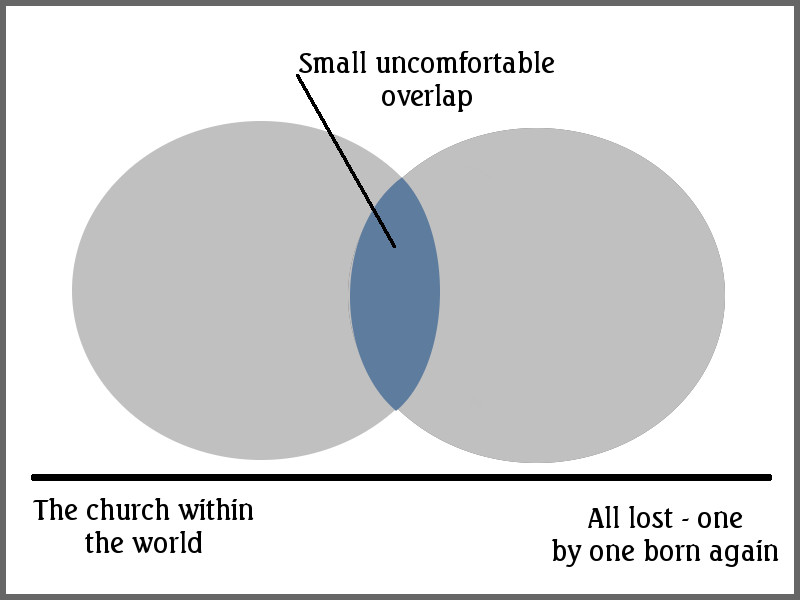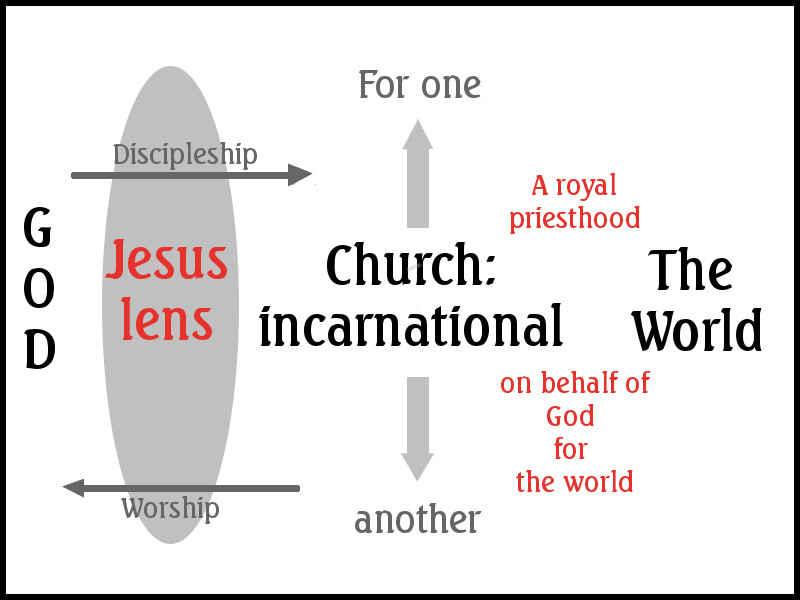In a recent set of posts I picked up on the redemptive trajectory toward the calling of being a ‘royal priesthood’ where I suggested that (working backwards) the Temple, the kingship, the priesthood in Israel were all signs of fallenness from the calling to be in the world, among the nations for the nations and for the world. I have put this together in a small ebook:
If Israel distorted its election to be one of ‘we are saved, the world is lost’, rather than we have been chosen so that God might be present in all of creation, my suggestion was that this indeed was the purpose of the Incarnation and the continued incarnated life of the body of Christ. The church is not here to bring the world into the church through a ‘born again one by one door’ (don’t leave yet – I have more to say!!) but to be the means by which God is manifest in the world. In one way we might say the calling of the church is to ensure that we actually have a very good world!
A hard-line evangelical approach has a starting point of ‘all are lost except for those who are born again’, which is often taken to be those who have prayed the sinner’s prayer. If that be true then the analogy that everyone by birth is caught up within a burning building and they have to be pulled out by whatever means is necessary is not inaccurate. Building bridges only for the purpose of getting them out of the building can therefore be justified. Of course the majority of evangelicals have a few ‘exceptions’ starting with babies who die before the age of accountability. The further one moves to ‘the church is here to enable the world to be the world’ the further away from the burning building analogy one gets. It leaves for those who place Jesus as central, rather than as a good / best example of humanity, but are on the opposite ends of that spectrum a very uncomfortable overlap, and many times a small overlap, where they can agree and work together:

At both ends of the spectrum there will be a viewpoint that Jesus is not genuinely present at the other end of the spectrum, but given the centrality of Jesus there will be some shared core – indeed I would suggest a genuine fellowship in the Holy Spirit. The purpose though of election comes in view as to where on the spectrum one stands.
Part of our challenge is the reading of Scripture – read it as I do and we will agree!! That is the wonderful history of protestantism – the multiple readings possible of Scripture. So where am I standing on this spectrum?
First an approach to election is very key. I see no basis for the ‘God elected some from all eternity’ approach – the election for the believer in Scripture is the election of Christ, and we are elect in him, in other words we are elect when we are in him. This parallels the election of Abraham and therefore all who are in him. I do not view it along individual lines but corporately in the individual chosen – Abraham or Christ. Further election is for a purpose, and the angle I have been pushing is that of the royal priesthood call. To represent God to the world and to represent the world to God. So essentially the church is here so that God’s transforming presence can be in the world – the church being the stewards of the future.
So ‘salvation’? There is a reception of the Spirit of Jesus that is witnessed to within the NT, but I cannot go as far as to suggest all who do not receive the Spirit of Jesus are lost. Indeed I would rather work with the untidy statements of:
- All who receive Jesus are saved, and
- all who reject Jesus are lost.
The statements are untidy as those two categories do not account for the entire human family. It also opens the possibility that a number who have prayed the sinner’s prayer have not received Jesus, as they might simply have received a Jesus of our making. Untidy? Yes. But we cannot tidy everything up in this life – there is a tidying up day yet to come.
The previous two posts – the church is here for God was so that God could be present in the world (‘the whole earth is mine’); the second one on being here for one another was not as an end in itself. There is an equipping for works of service that lies at the heart of what we carry in God for one another. The church is not simply here for the world, but that is our incarnational focus. Through our testimony people can be genuinely ‘born again’, even if that is a very limited NT term, and also through our priestly calling this world can move toward the New Jerusalem vision, without fully arriving there.

